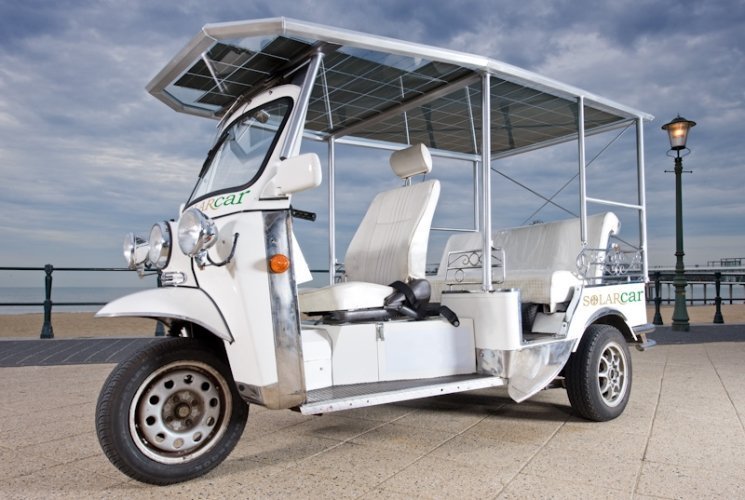Solar Powered Tuk Tuk Bangkok A Green Mode of Transport

Tuk Tuk Bangkok :Former Thai Air Force officer Morakot Charnsomruad has invented an electric tuk-tuk, powered by a solar battery boosted by a solar panel on the vehicle’s roof.
Morakot has a workshop in Bangkok’s outer suburbs where he and his team create a variety of green vehicles, such as golf cars and resort transport.
Bangkok’s tuk-tuk drivers were less than impressed with the power of the solar vehicle, but the solar solution has the potential to reduce noise and pollution on Bangkok’s streets when it is fully developed.
The solar tuk-tuk will cost less than THB 30 a day to keep operational. reported Energy Business News.
An auto rickshaw, also known as a three-wheeler, samosa, tempo, tuk-tuk, trishaw,autorick, bajaj (in India and Indonesia), bajaji (in Madagascar and Tanzania), keke Napepor Maruwa (in Nigeria), rick, tricycle, mototaxi, baby taxi, lapa or tukxi (Piaggio Ape Calessino) in popular parlance, is a motorized development of the traditional pulled rickshawor cycle rickshaw.
Most have three wheels and do not tilt. An exception is in Cambodia, where two different types of vehicles are called tuk-tuks, one of which (also known as a remorque) has four wheels and comprises a motorcycle (which leans) and trailer (which does not).
The auto rickshaw is a common form of urban transport, both as a vehicle for hire and for private use, in many countries around the world, especially those with tropical or subtropical climates, including many developing countries
In 1947, Corradino D’Ascanio, aircraft designer at Piaggio and inventor of the Vespa, came up with the idea of building a light three-wheeled commercial vehicle to power Italy’s post-war economic reconstruction. The Piaggio Ape followed suit.
Auto rickshaws in Southeast Asia started from the knockdown production of the Daihatsu Midget which was introduced in 1957. Japan exported three-wheelers to Thailand since 1934. Moreover, The Ministry of Posts and Telecommunications of Japan donated about 20,000 used three-wheelers to Southeast Asia. In Japan, three-wheelers went out of use in the latter half of the 1960s.
Tuk Tuk Bangkok
[wp-review id=”4205″]
Nice howe you explain
Thanks you, glad you enjoyed it.